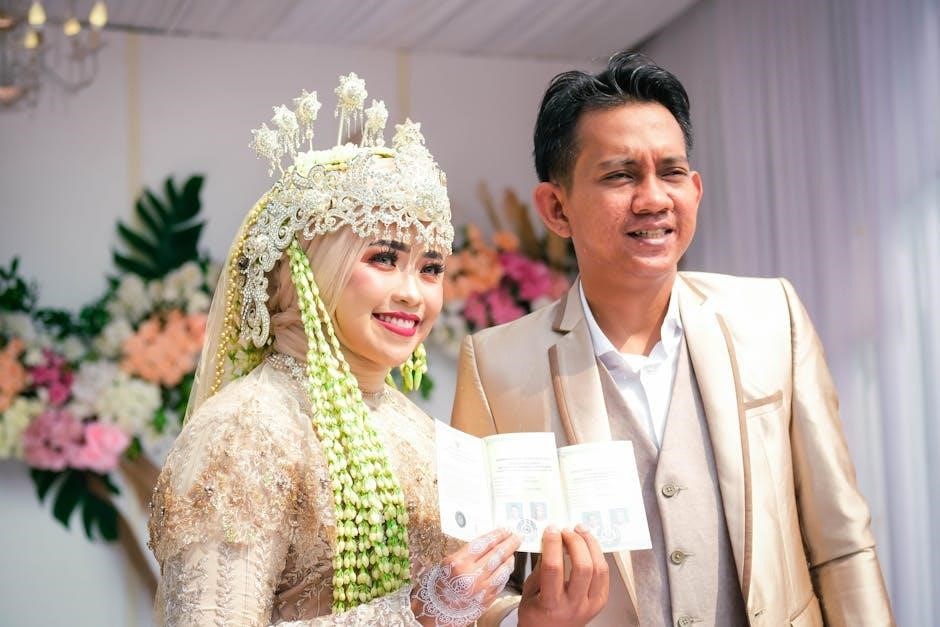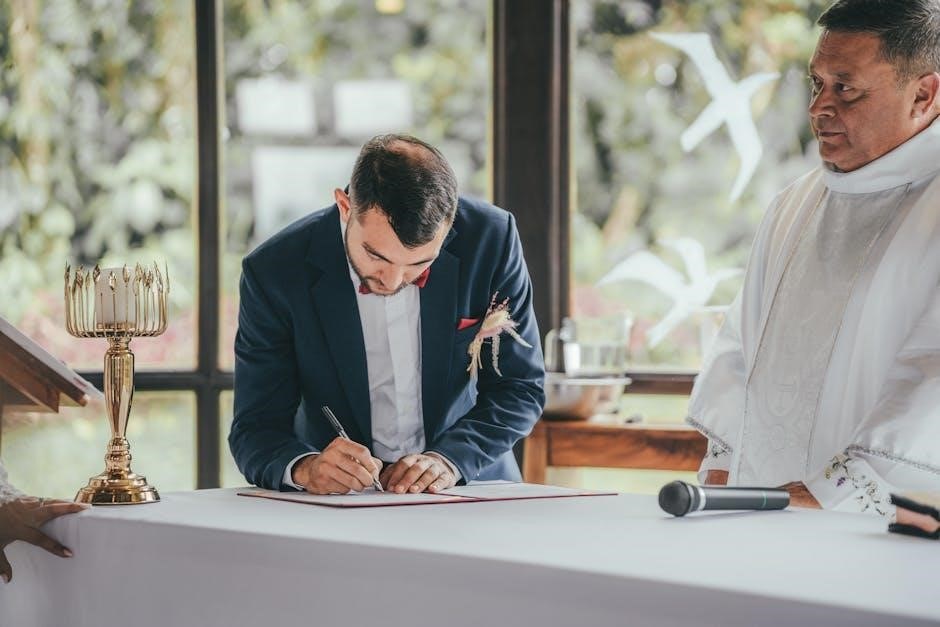Georgia Marriage License Application: A Comprehensive Guide
If you’re planning to tie the knot in the Peach State, this guide provides essential information․ It covers the application process through probate courts, including necessary documents․
Eligibility Requirements
To obtain a marriage license in Georgia, certain eligibility requirements must be met․ Firstly, applicants must be of sound mind and not have a living spouse from a prior, undissolved marriage․ As of July 1, 2019, no one under the age of 17 can obtain a marriage license in Georgia, regardless of circumstances․
If an applicant is 17 years old, they must demonstrate emancipation for at least 15 days․ Additionally, they must complete specialized premarital counseling․ If both applicants are 18 years or older, no parental consent is needed․
Furthermore, applicants must provide proof of age through a valid driver’s license, birth certificate, or passport․ Ensuring that you meet these requirements is crucial for a smooth application process with the county probate court․ Make sure you have the correct documents․
Age Restrictions for Applicants
Georgia law sets specific age restrictions for obtaining a marriage license․ As of July 1, 2019, individuals must be at least 17 years old to apply․ However, those under 17 are prohibited from obtaining a marriage license under any circumstances․
If an applicant is 17 years old, they must meet additional requirements․ These include demonstrating legal emancipation for a minimum of 15 days and completing premarital education․ Furthermore, when one applicant is 17, the older applicant can be no more than four years older․
Applicants 18 years of age or older face no additional age-related restrictions, provided they meet all other eligibility criteria․ Proof of age, such as a driver’s license, birth certificate, or passport, is required for all applicants to verify their age․ Understanding these regulations is essential․
Identification Requirements
When applying for a marriage license in Georgia, providing proper identification is crucial․ Both applicants must present valid photo identification containing their correct name and date of birth․ Acceptable forms of identification typically include a valid driver’s license, a state-issued ID card, or a passport․
For applicants born outside the United States, an original or certified copy of their birth certificate, along with a certified translation in English if applicable, is often required in addition to a valid passport․ These documents help verify identity and age, ensuring compliance with Georgia law․
It’s essential to ensure that the identification presented is current and has not expired․ Any discrepancies in names or dates of birth may cause delays or rejection of the application․ Check with the county probate court for their specific identification requirements․
Residency Requirements
Georgia’s residency requirements for obtaining a marriage license are fairly straightforward․ If either applicant is a resident of the State of Georgia, they can obtain the marriage license from any probate court within the state; It’s not mandatory to apply in the county where either applicant legally resides․
However, if neither applicant is a resident of Georgia, they must apply for the marriage license in the county where the marriage ceremony will be performed․ This ensures that the marriage is properly recorded and recognized within the state’s jurisdiction․
Proof of residency, such as a valid driver’s license or state-issued ID with a current address, may be requested by the probate court․ It’s always best to verify the specific requirements with the county where you plan to apply to avoid any complications during the application process․

The Application Process
To get a marriage license in Georgia, visit the county probate court․ Some courts offer online applications, but processing is typically walk-in․
Where to Apply: County Probate Courts
In Georgia, the journey to obtaining a marriage license begins at your local County Probate Court․ These courts are responsible for issuing marriage licenses to eligible couples․ If either applicant resides in Georgia, you can apply at the Probate Court in any county within the state, regardless of where the wedding ceremony will take place․ It’s not mandatory to apply in the county where either applicant legally resides․
Henry County Probate Court is a common location․ Both prospective partners must appear in person at the Probate Judge’s office to complete a marriage application․ Remember to bring all required documents to streamline the process․ The marriage license is valid only for ceremonies performed within Georgia․ If the signing occurs within Georgia, it must happen in the county where the license was originally issued․
Online Application Availability
While some Georgia counties may offer the convenience of initiating the marriage license application process online, it’s crucial to understand that the entire process typically cannot be completed remotely․ Often, the online portion serves as a preliminary step, allowing applicants to fill out the necessary forms and provide required information before visiting the Probate Court in person․
Keep in mind that even if an online application is available, you will likely still need to appear in person at the Probate Court to submit original documents, pay the required fees, and finalize the application․ Some counties require you to return the original marriage license to the Probate Court either personally or via U․S․ Mail, particularly if you have an officiant for your ceremony․
Walk-in Basis Processing
In many Georgia counties, marriage license applications are primarily processed on a walk-in basis․ This means that prospective couples can visit the County Probate Court during its regular business hours to submit their application and required documents․ While some courts may encourage or even require initiating the process online, the finalization often necessitates an in-person visit․
It’s advisable to check the specific requirements and procedures of the Probate Court in the county where you intend to apply․ Some courts may accept appointments to avoid long wait times․ Remember to bring all necessary documentation, including valid identification, proof of divorce (if applicable), and any other required paperwork to ensure a smooth and efficient application process․ Be prepared to complete the application on-site and pay the associated fees․

Required Documents
When applying for a marriage license in Georgia, you must present valid identification․ If previously married, you’ll also need to provide divorce decrees or death certificates․
Acceptable Forms of Identification
To obtain a marriage license in Georgia, you and your future spouse must provide valid identification․ This is crucial for verifying your identity and age․ Acceptable forms of identification typically include a valid driver’s license issued by any state․
A state-issued identification card is also accepted, ensuring that your name and date of birth are accurate․ Original or certified copies of birth certificates are valid․ A valid passport is another universally accepted form of identification, providing proof of citizenship․ A valid military ID can be used․
The identification must contain your correct name and date of birth․ These documents help the probate court ensure that all legal requirements are met․ If you are unsure whether a particular document will be accepted, it’s best to contact the probate court in the county where you plan to apply․
Divorce Decree or Death Certificate (if applicable)
If either applicant has been previously married, providing a divorce decree or death certificate is essential․ This documentation proves the legal termination of the previous marriage, ensuring the applicant is eligible to remarry under Georgia law․ The probate court requires either a signed or sealed divorce judgment․
If the previous spouse is deceased, you must provide a certified copy of the death certificate․ Having these documents ready when applying for a marriage license will minimize delays․ Failure to provide this documentation will prevent the issuance of a marriage license․
Ensure that the divorce decree includes the judge’s signature and court seal, if applicable․ The death certificate must be an original or a certified copy issued by the appropriate vital records office․ Remember to gather these necessary supporting documents to streamline your application process at the probate court․

Post-Application Information
After obtaining your marriage license, understand officiant duties and license validity․ The officiant must complete the license, and the original must be returned promptly, either personally or by mail․
Officiant Responsibilities
In Georgia, marriage solemnization falls upon authorized individuals such as ministers, judges, city recorders, and magistrates․ It is the couple’s responsibility to find an officiant willing to complete the marriage license․ After the ceremony, the officiant must ensure the license is properly filled out and promptly returned to the Probate Court․
The officiant’s role is crucial in legalizing the marriage․ They must verify the information on the license, witness the signing, and submit it as required․ Failure to do so can create complications․ Remember, the signing must occur in the county where the license was initially issued․ Carefully follow instructions provided by the court․
The officiant plays a pivotal role, by ensuring compliance with all Georgia laws․
License Validity and Expiration
One notable advantage in Georgia is that marriage licenses do not have an expiration date․ This means once you obtain your license, you can marry at any time in the future․ There is no rush․ However, it’s crucial to remember that the marriage ceremony must be performed within the state of Georgia․
While there’s no expiration date, prompt return of the completed license is essential after the ceremony․ Typically, the officiant is responsible for returning it to the Probate Court, either in person or by mail․
Ensure all details are accurately filled out before submission․ This avoids any potential delays or complications in officially recording your marriage․ Take your time to ensure everything is correct․

Premarital Education
Georgia encourages premarital education․ Couples completing a qualified premarital education course may be eligible for a reduced marriage license fee, making it both beneficial and cost-effective․
Reduced Fee for Premarital Education
In Georgia, couples who complete a premarital education course meeting specific requirements may qualify for a reduced marriage license fee․ This incentive encourages prospective spouses to engage in counseling before marriage․ To be eligible, the premarital education must address conflict management, communication skills, financial responsibilities, and family roles․
The counseling must be provided by a licensed professional counselor, social worker, marriage and family therapist, psychiatrist, or psychologist licensed in Georgia, or an active member of the clergy․ Completing this education not only reduces the license fee but also equips couples with valuable tools for a successful marriage․
Proof of completion, as per O․C․G․A․ 19-3-30․1, must be presented during the application process․ This certificate validates that the couple has fulfilled the premarital education requirements, entitling them to the reduced fee․ It is a worthwhile investment in their future․
